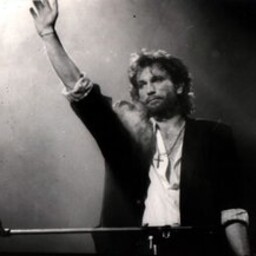
Хотите запечатлеть незабываемые моменты? Доверьте свои фотографии профессионалу! Услуги талантливого фотографа - гарантия качественных снимков и восхитительных портретов.
Информация о артисте
И́горь Влади́мирович Талько́в (4 ноября 1956, Грецовка, Щёкинский район, Тульская область — 6 октября 1991, Ленинград) — певец, автор песен, поэт, киноактёр.
В начале творческого пути сотрудничал с группами «Апрель», «Калейдоскоп» и «Электроклуб». В это время Игорем было написано много песен, но он не имел возможности исполнять их.
Впервые стал известен широкой публике после выступления на фестивале «Песня года» с композицией «Чистые пруды». После этого в 1987 году для того, чтобы поделиться с аудиторией собственными песнями, многие из которых по музыкальному стилю и тексту отличались от произведений, исполняемых им раньше, Игорь Тальков создаёт группу «Спасательный круг» и вскоре едет с ней на гастроли с программой, состоящей из двух частей: песни гражданского звучания и лирика. К 1989 году Игорем было написано более двухсот песен.
Убит 6 октября 1991 года в Ленинграде во время концерта во Дворце спорта «Юбилейный». Read more on Last.fm. User-contributed text is available under the Creative Commons By-SA License; additional terms may apply.
В начале творческого пути сотрудничал с группами «Апрель», «Калейдоскоп» и «Электроклуб». В это время Игорем было написано много песен, но он не имел возможности исполнять их.
Впервые стал известен широкой публике после выступления на фестивале «Песня года» с композицией «Чистые пруды». После этого в 1987 году для того, чтобы поделиться с аудиторией собственными песнями, многие из которых по музыкальному стилю и тексту отличались от произведений, исполняемых им раньше, Игорь Тальков создаёт группу «Спасательный круг» и вскоре едет с ней на гастроли с программой, состоящей из двух частей: песни гражданского звучания и лирика. К 1989 году Игорем было написано более двухсот песен.
Убит 6 октября 1991 года в Ленинграде во время концерта во Дворце спорта «Юбилейный». Read more on Last.fm. User-contributed text is available under the Creative Commons By-SA License; additional terms may apply.
Igor Vladimirovich Talkov (Russian: И́горь Влади́мирович Талько́в; November 4, 1956, Gretsovka, Tula Oblast, Soviet Union – October 6, 1991, Leningrad, Soviet Union) was a Russian rock singer-songwriter.
He is often being compared to another Russian singer and songwriter of that time, Viktor Tsoi (from Кино), whom, according to his diaries, Talkov highly appreciated and even dedicated a song on his death. Talkov's songs also have much in common - particularly from a lyrical perspective - with Russian bard music.
While Igor Talkov is mostly remembered for his beautiful songs about love and fate, most of his work held a clearly political message against the Soviet regime, desperately calling for a change. This is one of the reasons why Talkov was never popular with the Soviet government; even as a performer renown and loved throughout the whole Soviet Union, he lived in a small two-room apartment with his wife and son, even composing his masterful lyrics and music "on top of the washing machine in the bathroom", according to the rumours. Curiously enough, he was not satisfied with Perestroika, claiming it to be nothing but the same regime under a different guise. In his post-Perestroika songs, he openly mocked the changes, calling them a ruse. Talkov was an avid reader of pre-revolutionary Russian history, which served as the inspiration for many of his songs. He even guaranteed at his last concert that he was willing to "back up" his lyrics with historical facts.
He was fatally shot backstage at the Yubileiny concert hall in Leningrad, the next day was declared a national tragedy throughout the whole former Soviet Union. His funeral was a televised, nationwide event, where his casket was carried by some of the most prominent members of Russian stage to its burial. It is not uncommon to meet people in former Soviet countries who still dedicate October 6th to the honour of Igor Talkov.
Talkov is interred in the Vagankovskoye Cemetery in Moscow. Read more on Last.fm. User-contributed text is available under the Creative Commons By-SA License; additional terms may apply.
He is often being compared to another Russian singer and songwriter of that time, Viktor Tsoi (from Кино), whom, according to his diaries, Talkov highly appreciated and even dedicated a song on his death. Talkov's songs also have much in common - particularly from a lyrical perspective - with Russian bard music.
While Igor Talkov is mostly remembered for his beautiful songs about love and fate, most of his work held a clearly political message against the Soviet regime, desperately calling for a change. This is one of the reasons why Talkov was never popular with the Soviet government; even as a performer renown and loved throughout the whole Soviet Union, he lived in a small two-room apartment with his wife and son, even composing his masterful lyrics and music "on top of the washing machine in the bathroom", according to the rumours. Curiously enough, he was not satisfied with Perestroika, claiming it to be nothing but the same regime under a different guise. In his post-Perestroika songs, he openly mocked the changes, calling them a ruse. Talkov was an avid reader of pre-revolutionary Russian history, which served as the inspiration for many of his songs. He even guaranteed at his last concert that he was willing to "back up" his lyrics with historical facts.
He was fatally shot backstage at the Yubileiny concert hall in Leningrad, the next day was declared a national tragedy throughout the whole former Soviet Union. His funeral was a televised, nationwide event, where his casket was carried by some of the most prominent members of Russian stage to its burial. It is not uncommon to meet people in former Soviet countries who still dedicate October 6th to the honour of Igor Talkov.
Talkov is interred in the Vagankovskoye Cemetery in Moscow. Read more on Last.fm. User-contributed text is available under the Creative Commons By-SA License; additional terms may apply.

